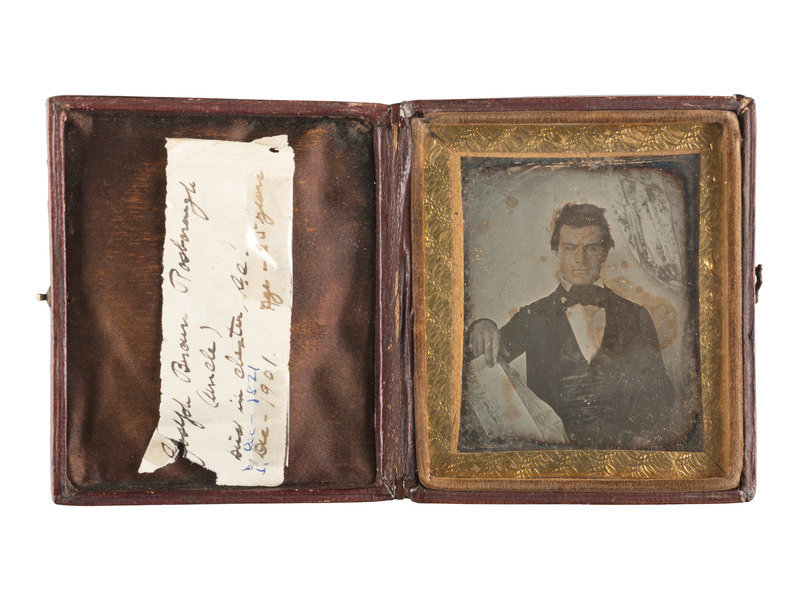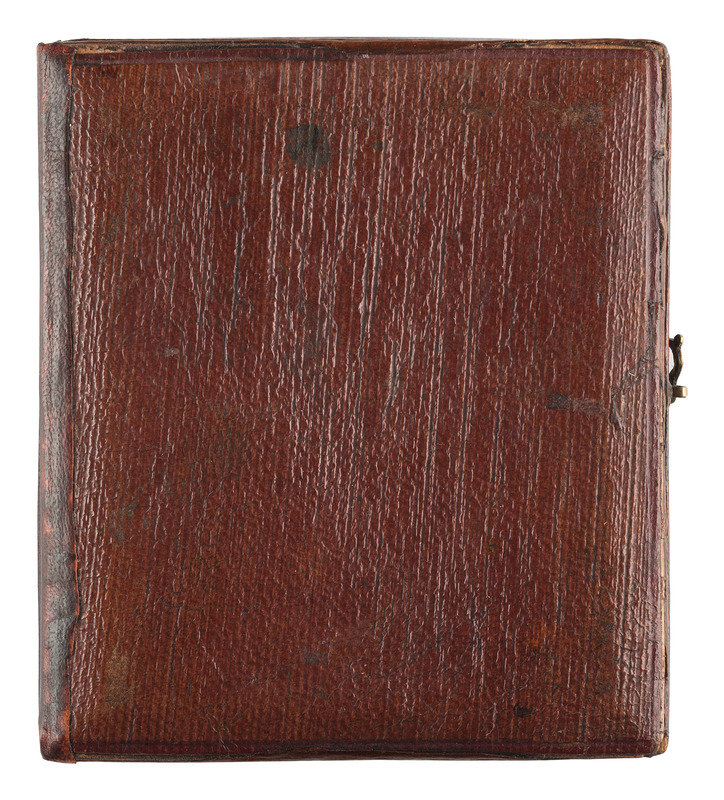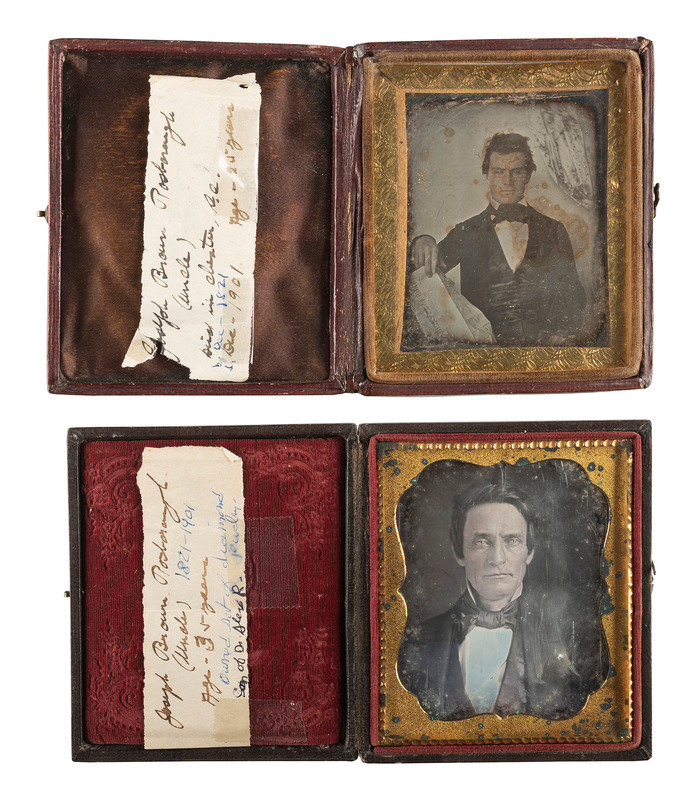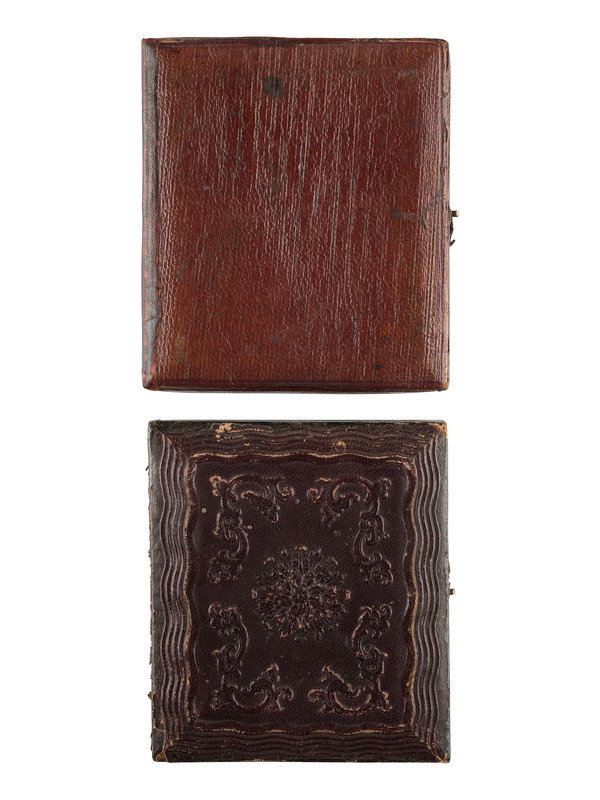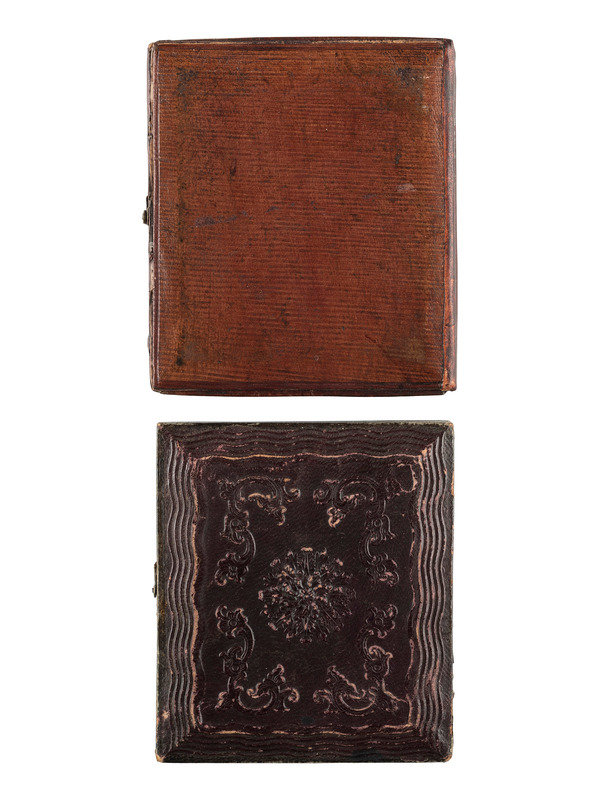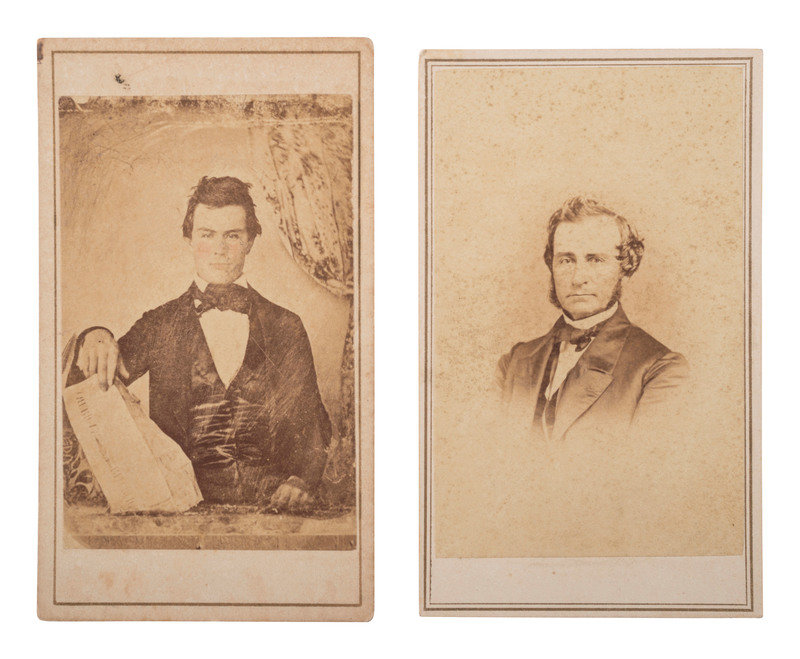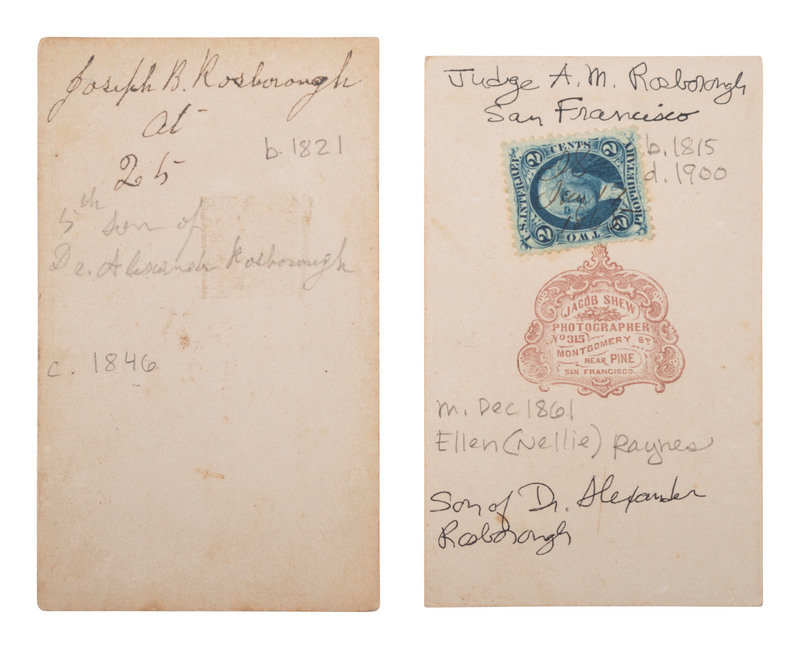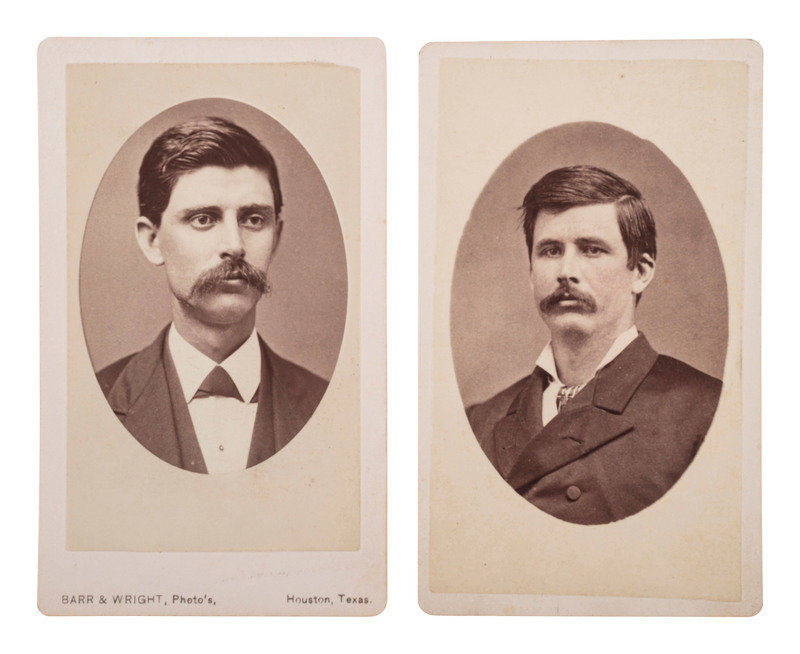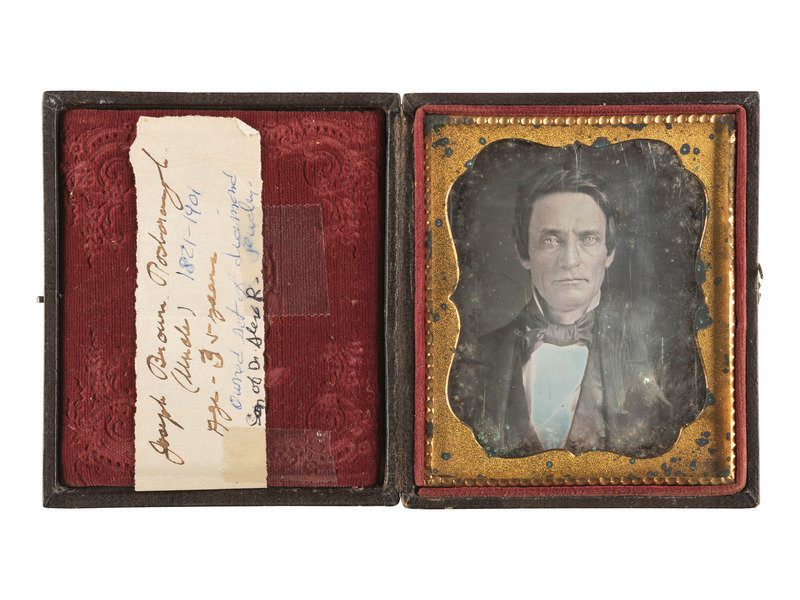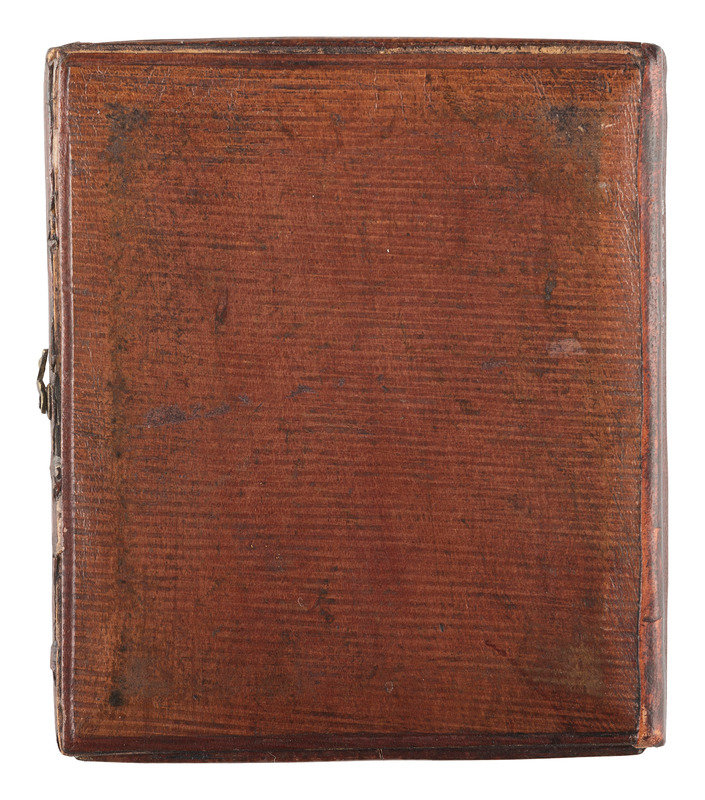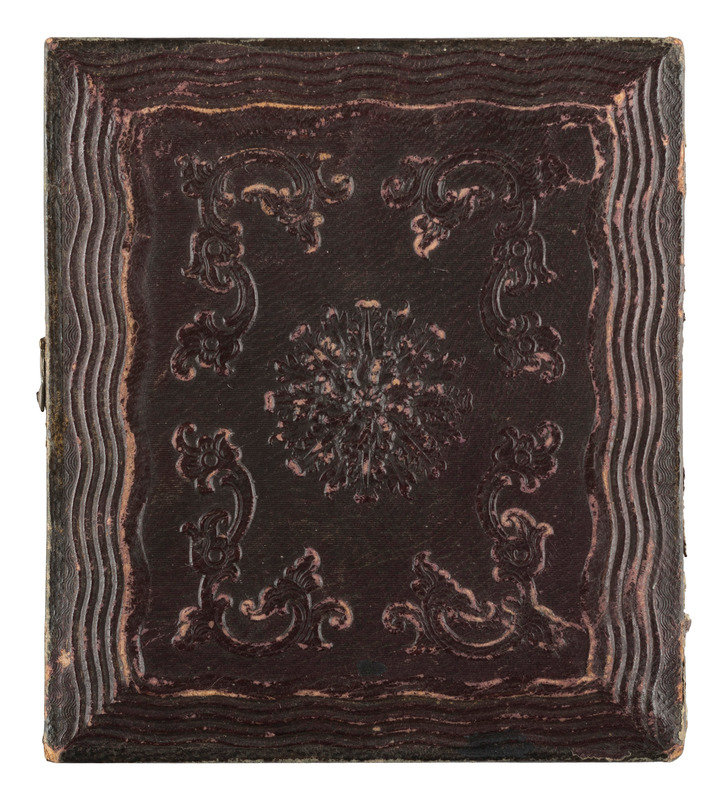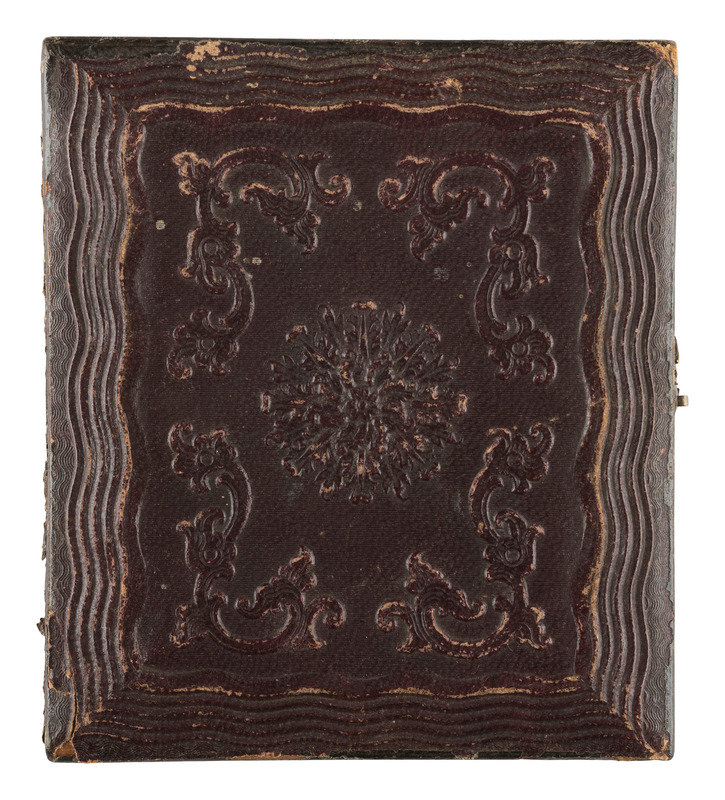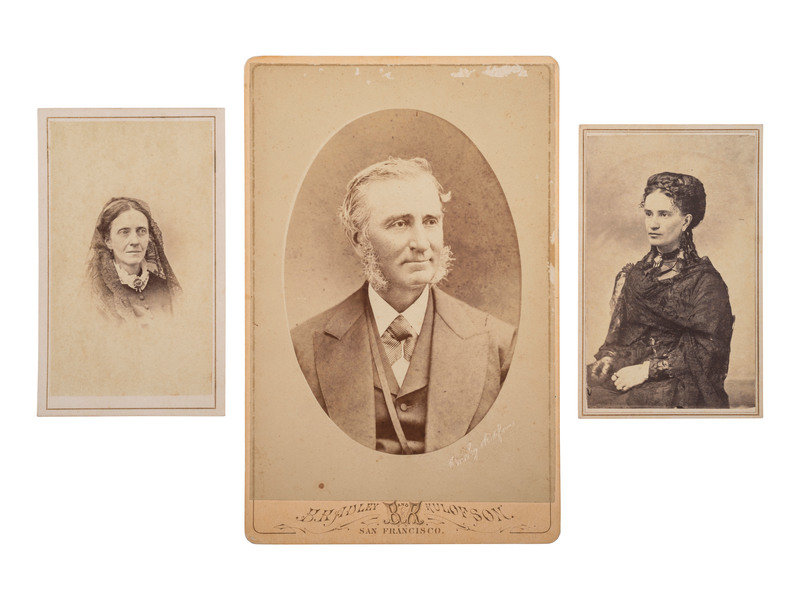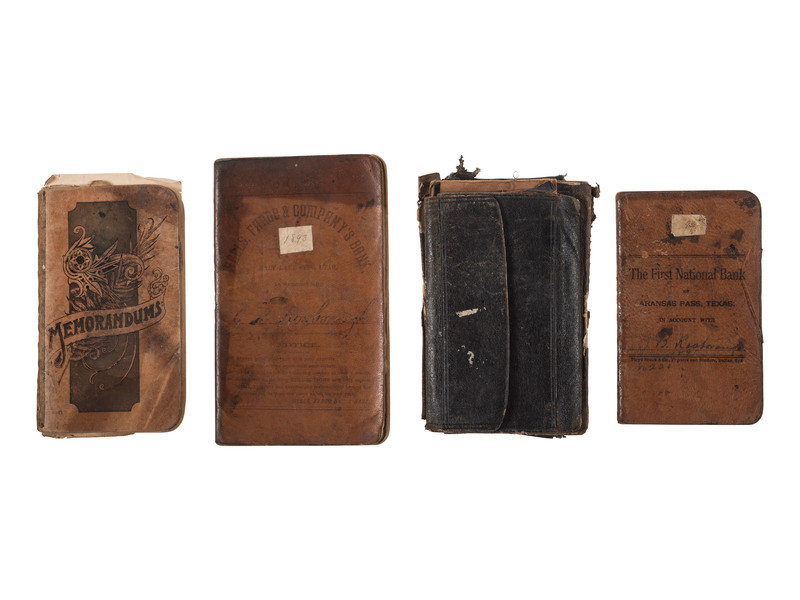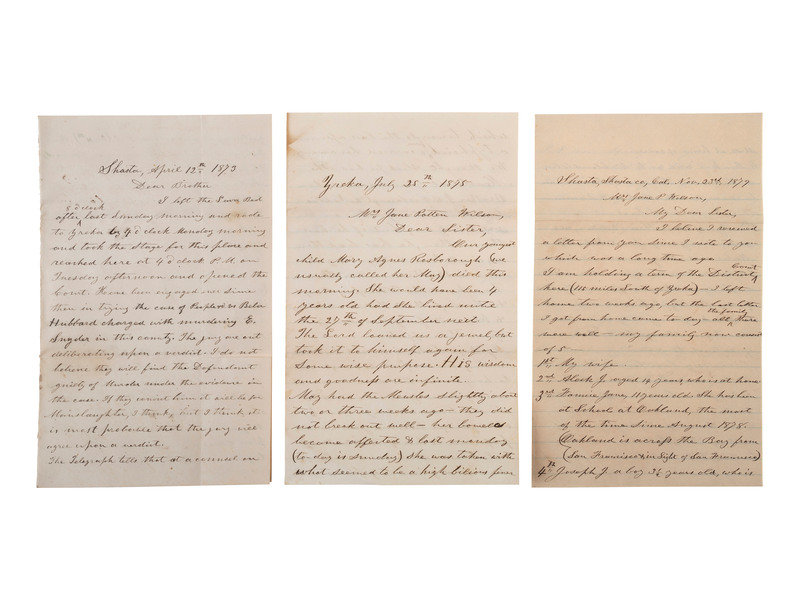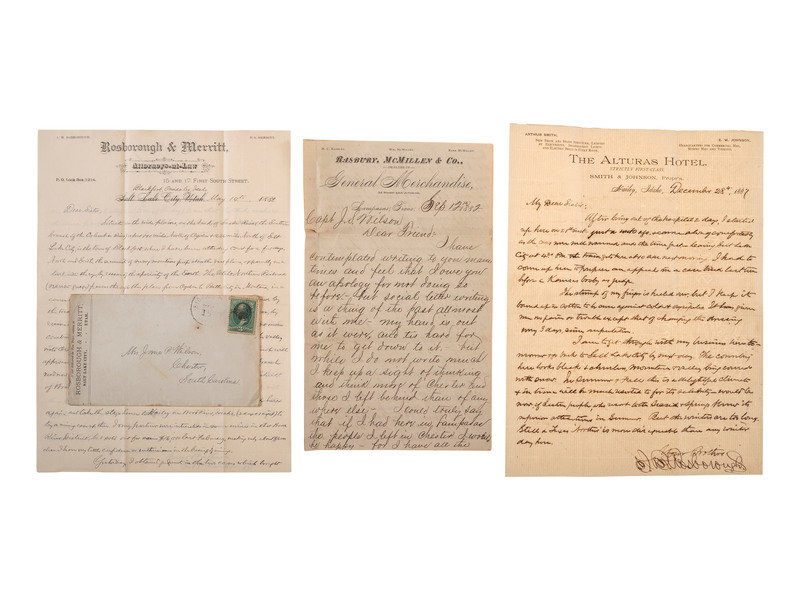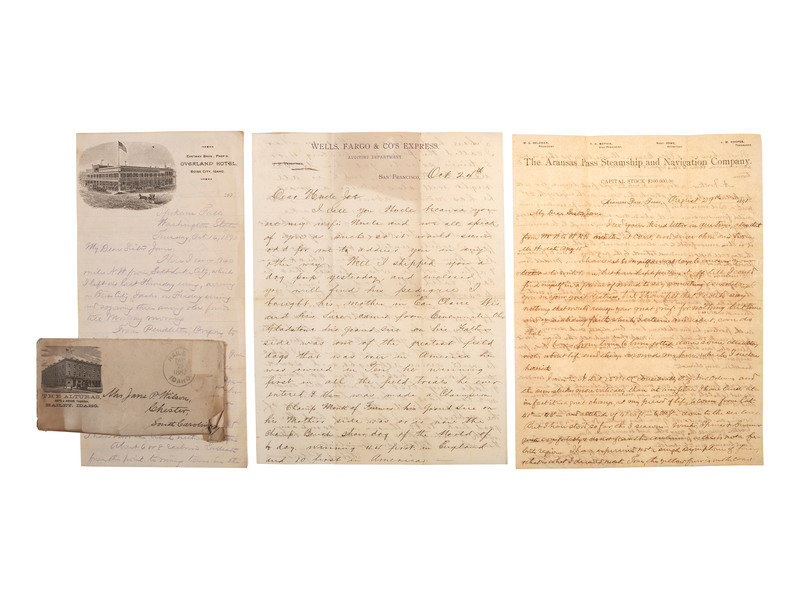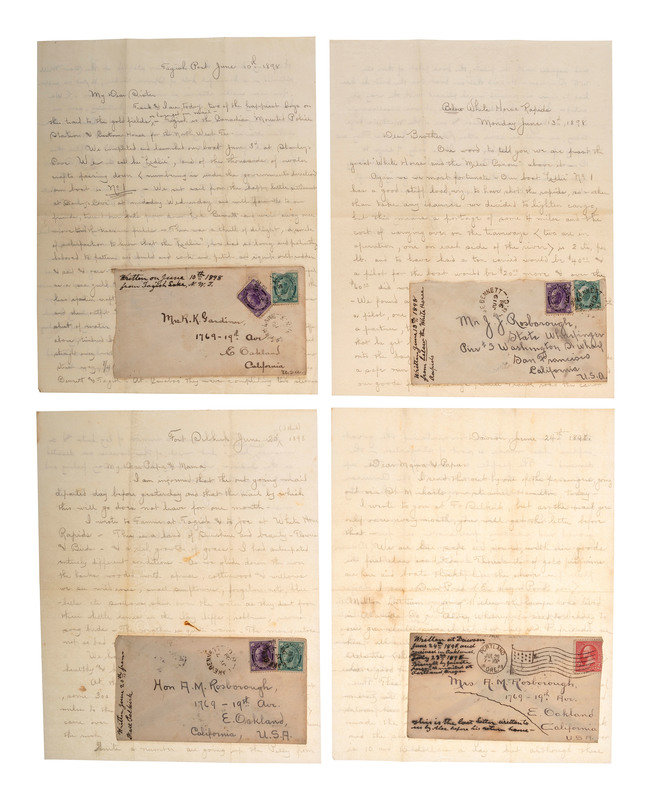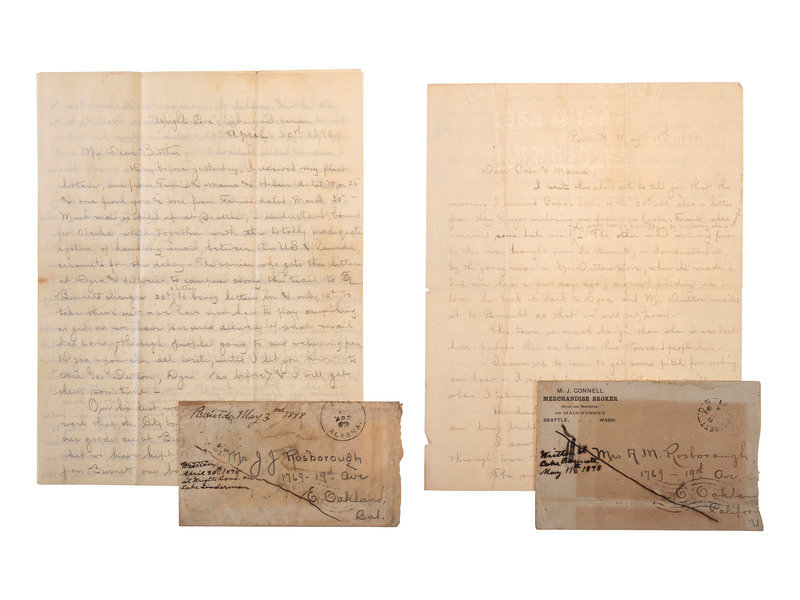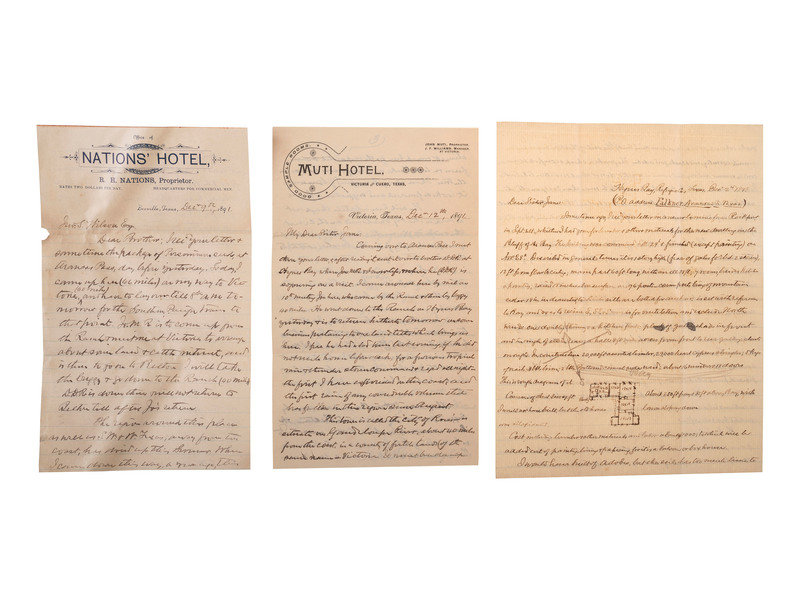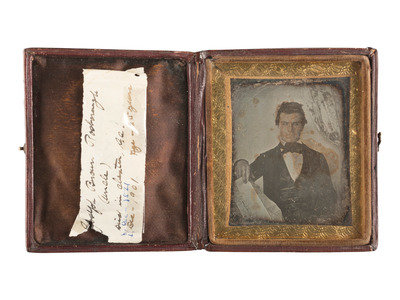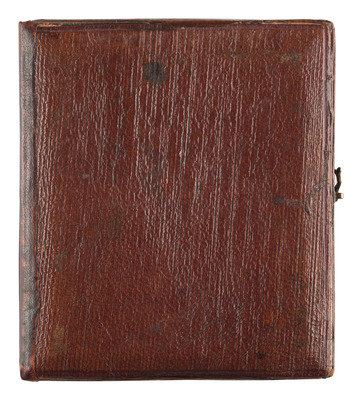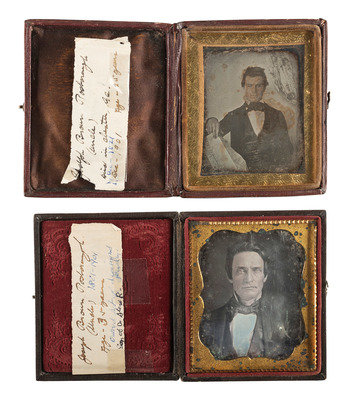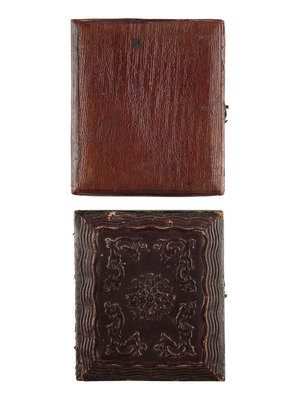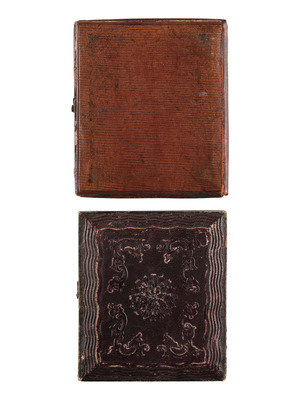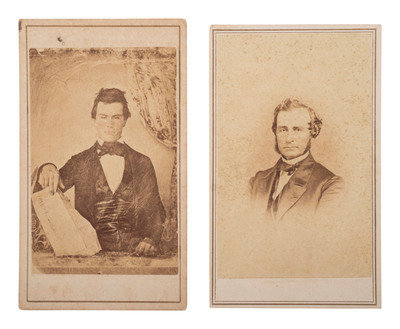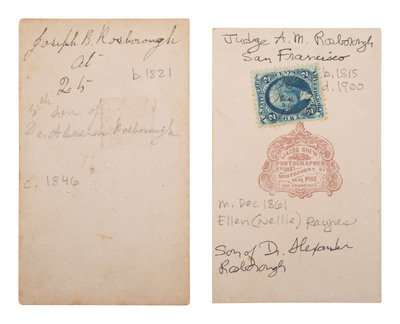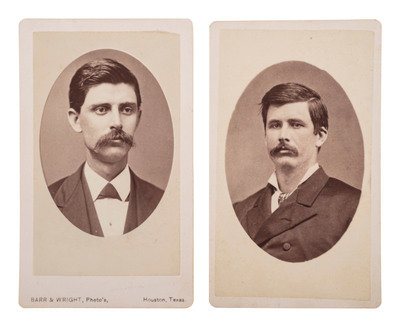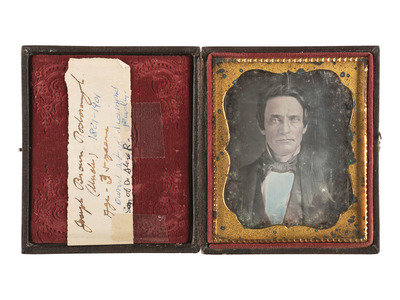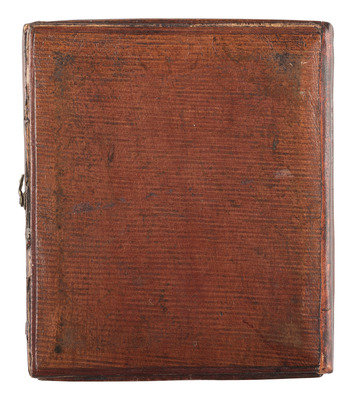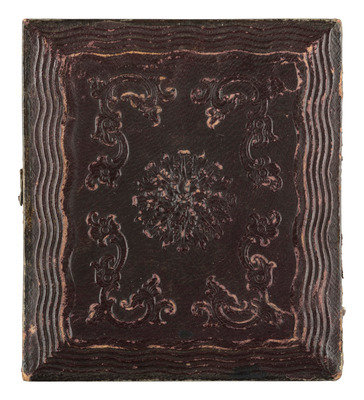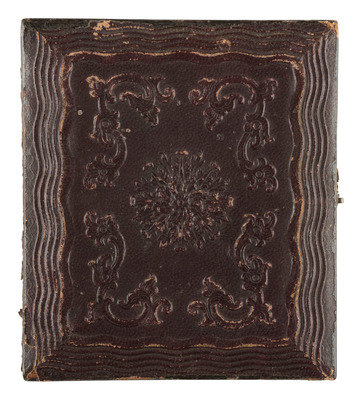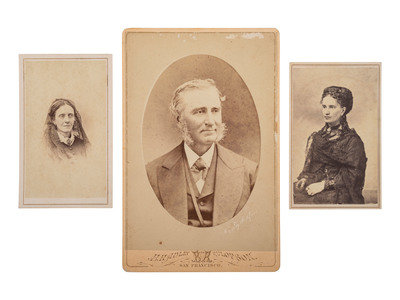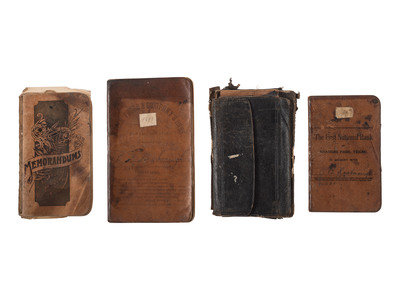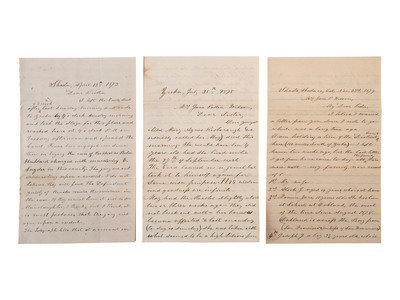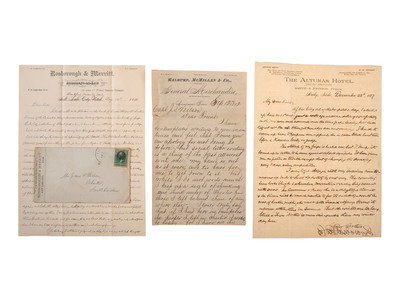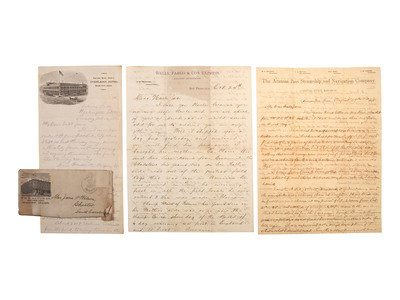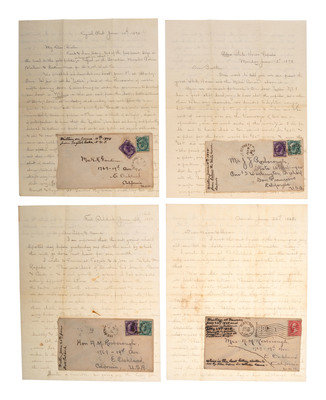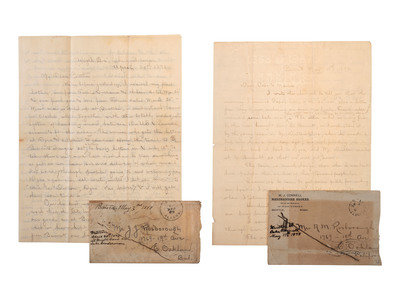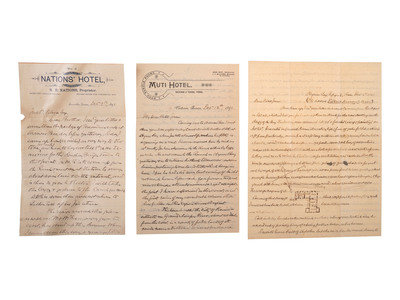Lot 246
[WESTERN AMERICANA]. The Rosborough family archive, including letters relating to the California Gold Rush, the Modoc War, the Klondike Gold Rush, and early settlement and mining operations in Idaho Territory, Utah Territory, Nevada, and Texas.
Sale 1046 - American Historical Ephemera and Photography Featuring the Civil War and American Militaria Collection of Bruce B. Hermann
Lots 1-296
Jun 21, 2022
10:00AM ET
Lots 297-560
Jun 22, 2022
10:00AM ET
Live / Cincinnati
Own a similar item?
Estimate
$15,000 -
25,000
Price Realized
$37,500
Sold prices are inclusive of Buyer’s Premium
Lot Description
[WESTERN AMERICANA]. The Rosborough family archive, including letters relating to the California Gold Rush, the Modoc War, the Klondike Gold Rush, and early settlement and mining operations in Idaho Territory, Utah Territory, Nevada, and Texas.
Archive of more than 200 items predominantly authored by Alexander Madison "A.M." Rosborough (1815-1900) and Joseph Brown "J.B." Rosborough (1821-1901), two Tennesseans who led a wagon train westward to California in 1850 and remained in the West cementing legacies as pioneers and businessmen. Alexander Rosborough was a founder of Crescent City, California, an Indian Agent who served as a negotiator during the Modoc War, and a prominent judge. Joseph Rosborough, the primary correspondent in the archive, was a practicing lawyer who traveled throughout the western mining regions, residing in Idaho Territory and Salt Lake City, Utah, during their early mining boom years before removing to Texas. Collection primarily consists of personal and business correspondence but is accompanied by a small number of photographs, most notably two early cased images of Joseph Rosborough. Highlights of the archive include the following: a letter signed by Andrew Johnson as a US Representative from the state of Tennessee along with signatures of the rest of the TN delegation; letters discussing preparations for the overland journey to California and providing descriptions of Gold Rush-era San Francisco; a letter written by Indian Peace Commission member Alexander Rosborough discussing "Captain Jack" and negotiations during the Modoc War; letters from Joseph Rosborough describing early Idaho Territory mining towns and providing colorful narratives of his experiences in the rapidly growing American West; and letters from Alexander Joseph Rosborough (1865-1960) as he followed stampeders into the Yukon during the Klondike Gold Rush. Many letters with covers. Conditions vary, but generally good. Various places, 1850 – 1900 (approx. 50 letters 1850-1876 from locations including San Francisco, Yreka (CA), Idaho City (IT), Virginia City (NV), Boise City (IT), Silver City (IT), and Salt Lake City; approx. 75 letters 1881-1890 from locations including Salt Lake City, New Orleans, Seattle, Belton (TX), Hailey (IT), and Boise (IT); approx. 90 letters 1891-1900 from locations including Aransas Pass, Victoria, and Belton, Texas, and the Klondike). Letters accompanied by 4 small notebooks utilized by Joseph Rosborough for memoranda and financial accounting and approx. 20 pieces of ephemera and assorted documents including a ca 1871 "Map of the Central Pacific Railroad and Its Connections," newspaper clippings, Joseph B. Rosborough's will, and miscellaneous receipts and indentures related to Joseph's time in Texas.
Both Rosborough brothers were born in Chester District, South Carolina, but relocated with their family ca 1826 to Lincoln County, Tennessee. Alexander Rosborough enlisted in 1836 with a TN regiment and fought in the Creek War of 1836 and the Second Seminole War before his discharge in 1837. After graduating from the University of East Tennessee he read the law in Columbia, TN, and bought the Columbia Observer newspaper ca 1841 serving as editor and publisher for a period of years. Younger brother Joseph completed college and joined Alexander in the newspaper business from 1841-1845. The brothers sold the Columbia Observer ca 1845 at which point Alexander assumed the role of principal editor of the Nashville Whig. Motivated by financial debts incurred after the loss of their first newspaper establishment in a fire, Alexander joined the Tennessee Mining Company in early 1850 and became its superintendent. The company planned to take the overland route to California and to extract gold from quartz using a steam engine. Among those making the journey with him would be his brother, Joseph Rosborough.
The letters in the archive commence on 25 February 1850 as preparations are underway for the voyage to California. These early letters include letters of introduction/recommendation for Joseph to California businessmen from various East Coast merchants, and a notable letter sent from "Washington City March / [18]50" containing the signatures of the entire Tennessee Delegation who endorse Joseph B. Rosborough: "The undersigned Senators & Representatives in Congress from Tennessee...take the liberty of recommending him to the friendship and confidence of the people of California and of assuring them that he is a man of high standing for honour & courage, and all the qualities which ought to command respect for him as a man...." The letter is signed by 13 politicians including future President Andrew Johnson ("Andrew Johnson") who served at the time as U.S. Representative from Tennessee.
Three letters in the archive written by Alexander contain details of preparations for their trip and the reasons the newspaperman and lawyer decided to join the mining venture. Writing on 21 March 1850 from Nashville to friend Samuel S. Coin in Columbia, Alexander states: "I had expected to remain in charge of the Whig [newspaper] until I paid off all Jos. & my debts but an offer has been made to me to take the superintendence of a Mining Company & after studying over the matter I have come to the conclusion to take charge of it thinking that I could get out of debt quicker by going to California than by remaining here...." Alexander writes his brother Joseph from Nashville on 7 March 1850 with an urgent request: "I expect to start for California in a few weeks - please write immediately on receipt of this & let me know what facts you have learned in Washington from Ring & Wright & others in relation to how they work the quartz - its richness - how far it is from San Francisco & in which direction - how steam engines can be gotten there the cheapest and quickest ... what power engines are most suitable &&& - about $10,000 in cash has been raised here, a company of 7 or 8 formed & I suppose I am to be superintendent for 18 months...." In a fascinating 3pp follow-up letter, Alexander writes to Joseph again just days later detailing the seven members of the company and their roles (including in his list one enslaved "Negro man"), noting that "we could get any number of persons but don't want any more - if the steam engine is a much faster way of procuring gold out of the quartz...." He continues with details of the plans for the company: a member of the party will be heading to New York to procure the steam engine which will be sent to California "around the Cape," members of the company will be traveling via Panama to San Francisco and then to the gold fields to select a suitable location, and the remaining company members will proceed overland from St. Louis until they are met near at the Sierra Nevada pass by the members already out West who will lead them to the selected location. He continues with details of the wagons, mules, provisions, and more. He closes noting that the St. Louis papers indicate "there will be enough of emigrants along to 'Whip the Injuns' who are becoming a little troublesome."
There are no accompanying letters describing the overland portion of the voyage to California. The next Gold Rush-era letter is written from San Francisco and dated 4 April 1852 after the company has arrived in California. It is an illustrative 4pp letter from Joseph to his sister Jane "Jinnie" Patton Rosborough Wilson (1823-1900) in South Carolina and includes description of the rapidly growing city of San Francisco, "a great city - great in its variety, novelty, wealth, and enterprise," and also his opinion on the usefulness of bringing enslaved individuals to California: "Several South Carolinians, North Carolinians, and Georgians have recently arrived in this country, the most of them designing to operate in the quartz mines, and some of them bringing negroes with them. After all this is not so violent a free soil state, many men who brought slaves with them from Tennessee retain and have them still while a few have been run away...The present Legislature of this state has just passed by a large majority a Fugitive Slave bill providing for the reclamation of all slaves who were brought into the state prior to its admission into the Union as a state...If the project of dividing the state is successful the southern part will understandably be a slave territory & state, but till then, it is not prudent to bring slaves here, other than attached & sensible domestics." Changing directions he indicates that the break in the rains has allowed the miners to work upon a much larger area of the dry placers, and describes a walk along the wharf where voices from Europe, America, Asia and Africa could be heard along with Chinese immigrants with "shaved heads with long flowing quieus [sic]." After providing additional description of the city he references his new work as a merchant in partnership with a South Carolinian and notes that the paper on which he writes was brought from Columbia, TN, on a "ship of the desert (mules) and in a carpet bag which...I have carried more than 15,000 miles...."
Correspondence in the collection does not resume until 1860/61, and the political events unfolding in the eastern portions of the country are as palpable in the west. Writing from Yreka, CA on 28 May 1861 to his brother David D. Rosborough (1816-1907) of Belton, Bell County, Texas, Joseph describes business matters, but more significantly describes the rising tensions in the region: "I am becoming dissatisfied with this country and feel a growing inclination to leave it....the feeling is growing stronger with Southern people in this state on account of the manifestation of cowardly & brutal animosity on the part of the larger mass of Northern men in this country toward Southern people. Although there is no Mason & Dixon line on the Pacific still in soul & in spirit the line is as distinctly drawn here."
Joseph did ultimately relocate. His next letter is written to his sister on 10 September 1866, from Idaho City, Idaho Territory, a bustling town founded in 1862 amidst the Boise Basin gold rush, the largest since the Civil War. The mid-1860s were the peak of the town's prominence, and Joseph has already realized that fortunes were failing there: "This territory, as a placer mining region, has failed very much for the last year...A larger percentage of population (they are nomads in a mining country) have gone to Montana Territory above the Rocky Mountains...Of course they will have to fight the Indians - they expect that - and to lose many of their number, but that is a lottery in which especially in a mining country are always willing to 'take the chances.'" As for Joseph and his business partners working the mines, he explains that he has "witnessed too many failures in that line to engage in it...." Joseph and his partners seem to be primarily involved in the region as investors, who make money by the sale of "quartz interests" in the area and surrounding country. He also references his ongoing legal work which seems to constitute in some portion legal defense services for mine owners embroiled in disputes. Joseph shares that he has recently returned from Owyhee County (Idaho Territory), where he was "called to defend another suit against the famous silver mine known as the Poorman." Joseph notes that he will not return to the south which he views as grievously wronged by the North. He relays that in the recent territorial elections a large majority was won by the Democratic Party and in celebration "Dixie" was played by the band to the joy of the many southern sympathizers. While he has nothing to do with politics, he tells his sister that he admires and exalts the "freedoms of the Mountains, where men are free to think, speak and act." On 22 September 1866, Joseph has arrived in the City of Idaho, Idaho Territory. He describes in this letter at length Chinese herbal remedies for headaches, offering that it works quite well. He notes as well that "branch of Asiatic population has increased largely in this Territory this year, and is spreading up in to Montana Territory."
In December 1867 while laid over in Virginia City, Nevada, waiting for a stage to Idaho City, Joseph describes the boomtown as a "thriving city sustained by silver mining as is the whole state , for it has no seaboard, no navigable rim, no manufacturers and but little agriculture." He continues to describe the advance of the railroad and the landscape, recalling that along the shores of Donner Lake "just 21 years ago a part[y] of immigrants known as the 'Donner party' were caught in a snowstorm (30 feet deep) and most of the 25 or 30 perished, the survivors (4 or 5) sustained life by eating their companions." By the summer of 1868 he has relocated his home ("so far as I have any" he writes) from Boise City to Silver City, Idaho Territory. Joseph writes to his sister on 28 June 1868, that "Hostile Indians have til recently infested the country all around, but the whites have recently retaliated by slaughtering several bands. Last month the Indians killed the stage driver on the road home to Cal. 35 miles below here, shot two other men, were pursued to their camp in the great canons of the Owhyee river and all killed with their squaws & children." Additional letters from Joseph over the course of the next few years continue to provide richly detailed descriptions of western towns and cities, their people, and his business pursuits.
Alexander Rosborough's pursuits in northern California following his arrival there were no less impressive. Initially, Alexander mined in California with his partners from the Tennessee Mining Company, but he left the mines ca 1851 and rejoined his brother in San Francisco where both men worked for a time for the San Francisco Daily Evening Picayune. By 1853 he had departed San Francisco and in partnership with others established a settlement at present-day Crescent City, CA. It was here, during a time of particularly tense relations between the miners and the Native Americans, that Alexander was appointed as special Indian Agent for the County of Siskiyou in northern California. Alexander Joseph Rosborough (1865-1960), son of Alexander M. Rosborough, described his father's activities in northern California in a 1947 article for the California Historical Society: "His work, which involved traveling among the various tribes, straightening out their difficulties and sometimes furnishing food to keep them from starving, was arduous....The Indians placed great confidence in my father, and long after military posts had been established and he had resigned as special Indian agent to become county, then district judge, they continued to bring him their troubles for adjustment." Relocating from Crescent City to another boomtown, Yreka, CA, the eldest Rosborough practiced law. He was elected and served as Judge of Siskiyou County from 1855-1869 at which time he was elected District Judge of Modoc, Shasta, Trinity, and Siskiyou Counties serving from 1870-1879. It was while serving as District Judge that Alexander was called upon, at the request of the Modoc, to join an 1873 federal Peace Commission in negotiations with Kintpuash "Captain Jack," a chief of the Modoc tribe. Kintpuash and his small band of warriors were in a defensive position near present-day Lava Beds National Monument when Alexander and other negotiators met with him to discuss terms for peace. Alexander's letter offers a vivid and clear delineation of his thoughts on the negations. Writing his brother (presumably Joseph) from Shasta, CA, on 12 April 1873, Alexander states, in part: "I left the Lava Bed after 8 o'clock last Sunday morning and rode to Yreka by 4 o'clock Monday morning and took the Stage for this place....The Telegraph tells me that at a counsel [sic] on yesterday at one o'clock (the 11th) the Indians at the Lava Bed murdered Gen Canby & Dr E. Thomas....I went out with Meachum on the 4th and met Capt Jack and talked with him for four or five hours and became fully satisfied that there was but little choice with the Indians as to whether they would die or leave their place of nativity. They told me they were willing to give up lost land (where they were born and the place of their valuable fishing) if they could stay anywhere in the country which they knew.... After we returned to the camp, the Commissioners had a meeting at which I told them that there was, in my opinion, no use of talking anymore to the Indians - that if the Government would allow them to remain anywhere where the Indians know the country, it had only to say so and the Indians would agree to it, and if the Government intended remove them then there was no need of talking anymore, but to tell them they must leave or fight...."
Alexander M. Rosborough spent the remainder of his life in California. He moved to Oakland ca 1880 and passed away there in 1900. Joseph moved to Salt Lake City, Utah, in 1871 and remained there until 1890 when his deteriorating health drove him to seek a different climate. Joseph moved this time to Texas where he continued his business pursuits purchasing with partners more than 36,000 acres of land. He remained in Texas until 1898. A large volume of the archive's correspondence details Joseph's business and personal pursuits in Texas prior to moving one last time, returning to his home state of South Carolina where he would die in 1901, just one year after his older brother.
Forming another important part of the archive are seven letters written by Alexander M. Rosborough's son, Alexander Joseph Rosborough, who followed in the steps of his father and uncle by heading to the Yukon Territory in 1898 as part of the Klondike Gold Rush. His letters, spanning late April through late June 1898, come just on the heels of the April 3, 1898, "Palm Sunday Avalanche," the deadliest event of the Klondike Gold Rush during which an estimated 65 lives were lost. Alexander Joseph travelled from Oakland, CA, to the Klondike via the Chilkoot Trail. His letters are written from Lake Linderman, Lake Bennett, Tagish Post, Below White Horse Rapids, Fort Selkirk, and Dawson. On 20 April 1898 he writes to his brother from "Wrights Cove, Lake Linderman" describing what has since become the quintessential image of the Klondike Gold Rush: "When we reached the summit of Chilkoot Pass and for the first time gazed down across [?] Lake and off far, far away into the, what? snow everywhere I saw a little black moving line, like a colony of ants at work - they were men, women, - dogs, horses goats, donkeys, mules, all pulling sleds, coming to the Pass on the lake below and hauling away little by little their goods to lake Linderman 10 miles away - We pressed on paid our customs duty, were very fortunate in discovering our goods, with but short delay - and then - we joined the line." He continues in this same letter describing the sleds hauled by the stampeders, the extreme cold, and how he will team up with some bridge-builders and carpenters from Los Angeles "getting out logs - whip-sawing our lumber and building our boats - this will help us much....we are healthy and happy - There is something about this that I like." Later letters capture details of the overland and river expedition, as well as the inherent danger in it ("we hear that two men driving loaded dog sleds went through the ice and were drowned yesterday below where we are camped"). Having reached Dawson on 24 June, he shares with his mother and father details of the mining boomtown: "This is a typical mining town, the principal money in circulation is gold dust, each store, and saloon has its gold scales and when a purchase is made the miner throws down his buckskin sack and the shop-keeper weighs out the price...." Though the letters indicate Alexander Joseph intended to stay in the Yukon, he returned home to California in late July 1898.
[With:] 10 photographs, comprising: a sixth plate daguerreotype under mat and glass of Joseph B. Rosborough as a young man, ca 1846, casually seated in a studio setting and holding what appears to be a newspaper, with handwritten identification adhered to pad opposite the image "Joseph Brown Rosborough / (Uncle) / Died in Chester, S.C. / Dec - 1901 Age - 25 years" (tarnish at edges, spotting to plate); sixth plate daguerreotype under mat and glass of Joseph B. Rosborough, taken ten years later ca 1856, with handwritten identification adhered to pad opposite the image "Joseph Brown Rosborough / (Uncle) / Age 35 years" (tarnish at edges, spotting to plate, cracking to plate); a CDV without backmark identified on verso as "Joseph B. Rosborough / At / 25" which appears to be a copy image of the earliest daguerreotype image of him; a CDV without backmark identified in modern ink on verso as "Joseph Brown Rosborough / 1821-1901"; a CDV of Judge Alexander M. Rosborough with backmark of Jacob Shew of San Francisco; a CDV of Judge Rosborough's wife, Ellen "Nellie" Rosborough, photographed as a younger woman and with backmark of J. Hansen of Yreka, CA; a second CDV of Nellie seemingly taken at a later date without a backmark; two CDVs of later Rosborough descendants, one identified on verso as "Wm Edwin Rosborough" with backmark of Barr & Wright of Houston, TX, and another identified on verso as "Jos. Madison Rosborough" with backmark of F.P. Cooper of Belton, TX; cabinet card of Judge A.M. Rosborough with studio identification on mount of Bradley and Rulofson of San Francisco. Conditions of CDVs and cabinet card generally good given age with expected wear and light soil.
A REMARKABLE ARCHIVE WHICH EMBODIES BOTH WESTWARD EXPANSION AND THE PIONEER EXPERIENCE THROUGH THE LENS OF ONE VENTURESOME FAMILY.
Archive descended directly in the family. "Jinnie" Rosborough Wilson of South Carolina was the recipient of a large portion of letters from her brothers Alexander and Joseph. Her daughter Sarah "Sallie" Jane Wilson (1849-1940) never married and preserved the family archive which has been passed down through succeeding generations to the present consignor.
Due to its size and content, the Rosborough family archive cannot be adequately described within the confines of a catalog or online format. Questions related to additional manuscript content may be directed to the American Historical & Ephemera specialists.
Condition Report
Contact Information
Auction Specialist
